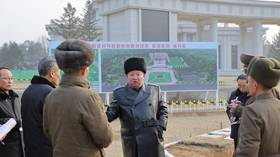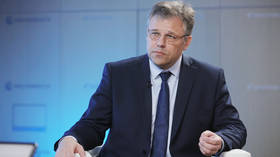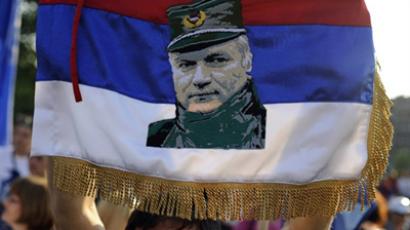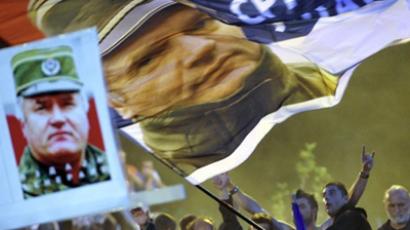I recognize only my own people’s trial: Mladic in long-suppressed interview
Ratko Mladic, now at The Hague facing charges of genocide, has largely been silent since his recent arrest. Back in 1995, however, he gave a candid interview explaining his side of the Srebrenica story, which RT can now reveal.
After more than 10 years in hiding, today Mladic looks more like an ill old man than the person who was allegedly responsible for the largest mass murder in Europe since WWII.In 1995, just one month after the Srebrenica massacre and three weeks after The Hague Tribunal pressed charges against Mladic, a Western TV crew managed to meet with the general for an interview. But despite the obviously high level of importance and the exclusivity, the interview was never aired.The tapes remained in Bosnia and Herzegovina in private archives and only now is the conversation being released to the public after RT managed to gain access to the materials.According to the Tribunal, the Srebrenica massacre refers to the killing of more than 8,000 Bosnian Muslims, mainly men and boys, in and around the town of Srebrenica in Bosnia and Herzegovina in 1995.
The killing was allegedly conducted by units of the Army of Republika Srpska under the command of General Mladic. In April 1993, the United Nations declared Srebrenica was a “safe area” under its protection. However the 400-strong contingent of Dutch peacekeepers failed to prevent the alleged massacre from happening.In the interview, Ratko Mladic gave a different picture of those events: “I can tell you that in April-May 1993 an agreement on Srebrenica was signed. It clearly defined it as a safe demilitarized area where no armed military could be present except for the UN soldiers. But instead of disarming the Muslim formations, as they had committed themselves to doing under the agreement on Srebrenica singed by me and General Morillon, the United Nations forces turned those safe areas into terrorist and fundamentalist bases from where our villages and towns were attacked. Muslims from Srebrenica and Zepa burnt down more than 200 Serbian villages around those two places and killed en masse and massacred all the Serb civilian population in many other villages.”The General also described in detail how sometimes the Bosnian Muslims were armed with the help of Iran under the supervision of the UN peacekeeping contingent.“Sometimes, they even used helicopters to airlift weapons from Iran and other combat hardware. We knocked down one such helicopter on the outskirts of Zepa two or three months ago,” he said.Mladic claimed that, despite knowing about the shipments of arms to the Bosnian Muslims and their alleged attacks on the civil Serb population, he held his forces back: “The Muslims attacked the enclave of Sarajevo, also a safe area, though it was not defined as such by any kind of agreements of the two parties. They massacred everybody whom they captured alive and killed several of our soldiers in the villages of Visnjica and Banja Lucica. The Muslim attack was carried out exactly from the exclusion zone on Mounts Igman and Bjelasnica, from which Republika Srpska had pulled out its forces in 1993, and which had been in confidence handed over to peacekeeping forces.”According to the general, by that time the bubble of patience had been forced to grow for two years and at one point it finally burst.“We retaliated with a counteroffensive in that area. We took maximum precautions to avoid casualties among civilians and representatives of the UNPROFOR, given the fact that NATO aviation was pounding air strikes on us, including civilian targets in the outskirts of Srebrenica and Zepa. We successfully finished that operation near Srebrenica and Zepa. With the help of the soldiers of the Dutch battalion, the representatives of the world community who were present in Srebrenica, and representatives of the UNPROFOR forces who were present in Zepa.” Mladic also outlined that those who surrendered were handed over or, at the time of the interview, some were still planned to be handed over to the International Red Cross. And those who died had been buried according to Muslim traditions. The interview moved to one of the most important aspects – the mass graves. Later, several sites with thousands of dead bodies were found in and around the Srebrenica area. These were the bodies of Bosnian Muslims who are thought to have been selectively picked and executed by Mladic’s forces from scores of refugees. In the interview, the general fiercely denies any accusation of executions having taken place.“Only those who died in battle were buried. For hygienic reasons their bodies had to be collected and buried in appropriate places until the warring parties agreed to exchange the remains of the dead with each other,” he asserted.
Given that Mladic’s story was totally different from that put forward by The Hague Tribunal and most Western media, the correspondent asked how the general felt after being branded as a war criminal. Mladic remained calm and said he had been partially following The Hague’s case against him, but claimed he did not feel like he needed to defend himself.“I don’t recognize any trial except the trial by my own people. I don’t need to defend myself, because these idiotic accusations have come from those centers which have been churning out lies through PR and similar organizations, creating such a chaos in these territories that the world community doesn’t know, doesn’t see or simply doesn’t want to see a way out of all this,” he insisted.“My people have never been occupiers,” was one of the main ideas put forward and reiterated by Ratko Mladic throughout the entire conversation. The general claimed he had been strictly protecting his nation, while the West and even Iran had sent weapons and “high-quality experts” to arm his enemies.“Unfortunately, the bad image of the Serbs and the Serbian people in general created by some media outlets has led to unequal and biased approach to the sides in conflict by part of the world community who took the side of the Croats and Muslims, who actually started this bloody war in the territory of the former Yugoslavia,” Mladic said.Currently, prosecutors at The Hague Tribunal are thinking about dividing the process against Ratko Mladic into two parts – Srebrenica in one separate trial and other war crimes the former general is accused of in another. However it is unclear exactly what the condition Mladic’s health is. Any information on that is made public only with his prior consent. According to his relatives, he is suffering from the effects of a stroke and had several heart attacks. Recently Mladic had hernia surgery and even refers to himself as “a very sick person”. The Tribunal’s chief prosecutor, Serge Brammertz, openly stated that the defendant’s health could deteriorate, which may affect the Tribunal’s ability to complete the trial.













